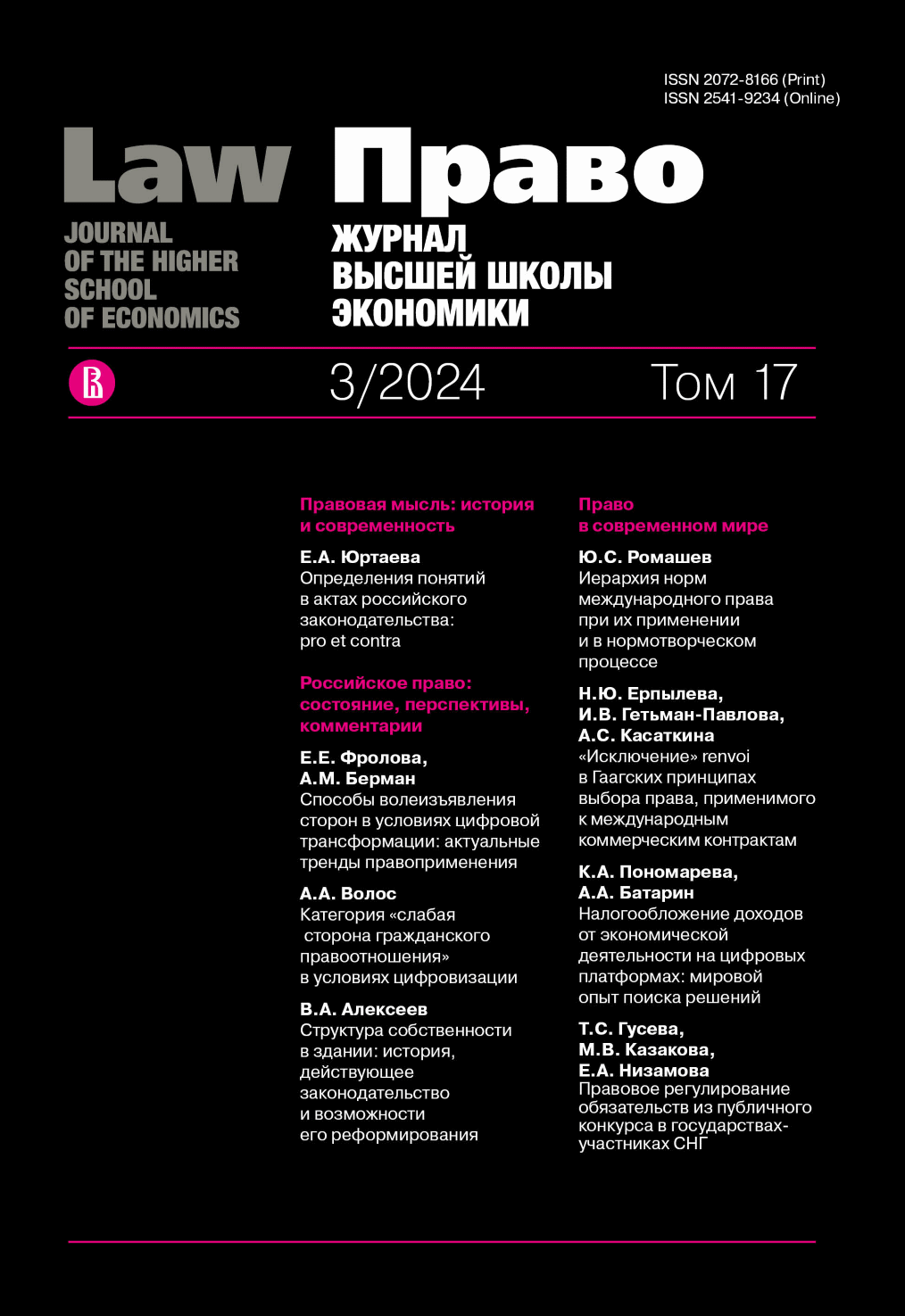Concept of Weak Party in Civil Matter in Context of Digitalization
Abstract
The article is devoted to key issues connected with qualification of subject in civil relation as a weak party. According to the author’s aim it is chosen the situation when the subject uses the digital technologies for the purpose of forming, changing, termination of civil rights and duties. It is considered how we can use the methodological decisions of the issue connected with the definition of the category “weak party in civil relation”. It can be significant in order to understand the directions of effective protection of weak party in civil relation under the circumstances of digitalization. The purpose of the research is to examine the features of the category “weak party of civil relation” and its transformation in the case of the digital transformation in society. To achieve the purpose the author in the first part of the research studies the general issues of the theory of weak party in civil relation. The second part of the article is connected with the unique features of weak party in civil relation in the case of the digitalization. Then it is discussed the issue arising from the protecting weak party’s interests in several cases connected with digital sphere (digital rights, digital assets, corporate relations, intellectual property). It was concluded the weak party’s essence and features should not be determined by the criteria of the legal status. The weakness of a party is the result of the difficulty of the specific rights’ exercising or of the several rights’ exercising in certain civil relation. The author’s point is than the basis of weak party protection in digital sphere is the criteria of transparency. It is meant than the procedure of contractual concluding and executing, the public offer’s content, possible mechanisms of termination should be open and understandable ones. Moreover, any participant in the relation should have access to all the information required by a specific agreement. Also, according to the author’s point, the rules of adhesion contract have a special purpose. It has a sense to use the Article 428 of the Civil Code of Russia for clearing definition and criteria of weak party. The most useful instruments of weak party protection are the rules of norms interpretation and the rules of contractual interpretation.
References
Bakulin A.F., Kuzmina A.V. (2020) Weak Party in Business-to-Business Contract: Standards and Burden of Proof. Vestnik grazhdanskogo protsessa=Herald of Civil Procedure, no. 2, pp. 203–250 (in Russ.) DOI: https://doi.org/10.24031/2226-0781-2020-10-2-203-250
Belov V.A. (2021) Consumer Terrorism: Theory and Practice. Part 1. Pravo i ekonomika=Law and Economics, no. 6, pp. 22–29 (in Russ.)
Cutts T. (2017) Smart contracts and consumers. West Virginia Law Review, vol. 122, no. 2, pp. 389–446.
Ebers M., Poncibo C., Zou M. (eds.). (2020) Contracting and Contract Law in the Age of Artificial Intelligence. Oxford: Bloomsbury, 328 pp.
Gabov A.V. (2021) Electronic Interaction and Digital Technologies in Corporate Governance of a Joint Stock Company in Russia. Pravo. Zhurnal Vysshey shkoly ekonomiki=Law. Journal of the Higher School of Economics, vol. 14, no. 2, pp. 24–64 (in Russ.) DOI: https://doi.org/10.17323/2713-2749.2021.1.65.99
Guliaeva O.N. (2023) Weak Party in Civil Matter: Civil Law Study. Candidate of Juridical Sciences Summary. Ulyanovsk, 36 p. (in Russ.)
Karapetov A.G. (ed.) (2020) Contract Law (General Part): Article-by-article Commentary to the Civil Code of Russian Federation (Articles 420-453). Moscow: M-Logos, 1425 p. (in Russ.)
Kasl F. (2018) Blockchain, společenská smlouva digitálního věku? Revue pro právo a technologie, vol. 17, pp. 3–17 (in Czech) DOI: https://doi.org/10.5817/RPT2018-1-1
Kaulartz M., Heckmann J. (2016) Smart Conrtacts — Anwendugen der BlockchainTechnologie. Computer und Recht, vol. 32, no. 9, pp. 618–624 (in German) DOI: https://doi.org/10.9785/cr-2016-0923
Kono T. (ed.) (2021) The Digital Economy and Competition Law in Asia. Singapore: Springer, 224 p.
Kuzmina A.V. (2019) Protection of the Weaker Party in Contract Law: Formation of the Doctrine. Vestnik Permskogo universiteta. Juridicheskie nauki=Perm University Herald. Juridical Sciences, no. 46, pp. 698–727 (in Russ.) DOI: https://doi.org/10.17072/1995-4190-2019-46-698-727
Nord S.J. (2019) Blockchain Plumbing: a Potential Solution for Shareholder Voting? University of Pennsylvania Journal of Business Law, vol. 21, no. 3, pp. 706–756.
O`Sullivan J., Hillard J. (2016) The Law of Contract. Oxford: University Press, 504 p.
Ovchinnikova Y.S. (2022) Digitalization of Insurance Survices: Protaction of the Weak Side of the Contract and Private Life. Imushchestvennye otnosheniya v Rossiyskoj Federatcii=Property Relations in the Russian Federation, no. 3, pp. 73–81 (in Russ.)
Schönfeld C. (2018) Smart Contracts under Swiss Law. The FinTech Edition, 219 p.
Sourdin T. (2021) Judges, Technology and Artificial Intelligence. The Artificial Judge. Cheltenham: Edward Elgar, 320 p. DOI: https://doi.org/10.4337/9781788978262.00005
Sukhanov E.A. (2021) On the Civil Nature of “Digital Property”. Vestnik grazhdanskogo pravo=Civil Law Review, no. 3, pp. 73–81 (in Russ.)
Tretyakov S.V. (2022) The Development of the Doctrine of Subjective Private Rights in Foreign Civil Law. Moscow: MGU Press, 608 p. (in Russ.)
Tserkovnikov M.A. (2021) Special Protection of a Weak Party in Contract of Adhesion. Zakon=Law, no. 9, pp. 42–47 (in Russ.) DOI: https://doi.org/10.37239/0869-4400-2021-16-9-42-47
Zimmermann D. (2014) Privatrechtsvereinheitlichung in Europa: Das Common European Sales Law und seine Textstufen. Bucerius Law Journal, November, 497 p.
Copyright (c) 2024 Volos A.

This work is licensed under a Creative Commons Attribution-ShareAlike 4.0 International License.





